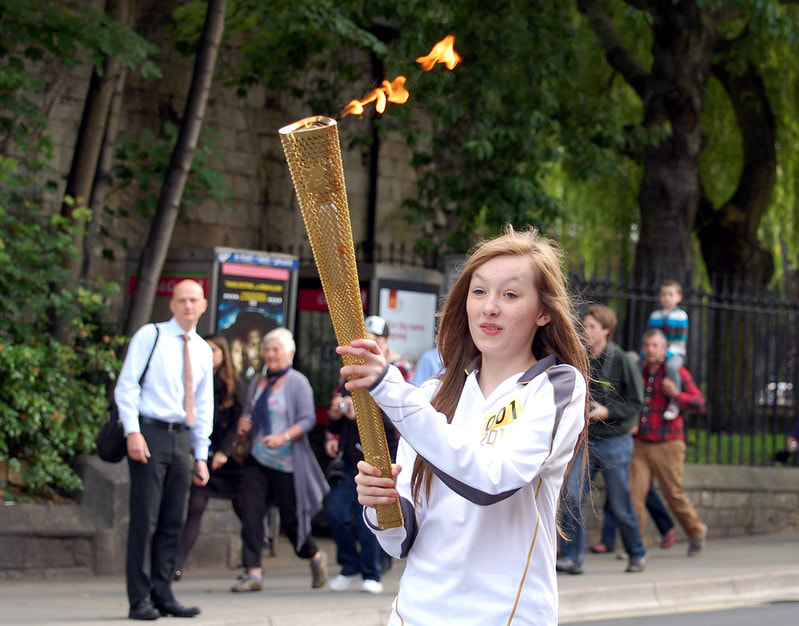|
The Olympics originated in Olympia, Greece about 3,000 years ago. They started as a religious festival honoring Zeus in the 8th century BC and continued until the 4th century AD. In 393 AD, Christian Emperor Theodosius The First banned "pagan" festivals, which ended the Olympics for almost 12 centuries. The first modern Olympics took place in 1896 in Athens with 12 participating nations. Fire became part of the ceremony during the 1928 Summer Olympics. Inspired by the ancient Greek drawings and writings of Plutarch, Dr. Carl Diem of Germany introduced the Torch Relay. It was not until 1938 that the flame also became part of the Winter Olympics.
The flame was meant to emphasize the link between the ancient and modern games. In the ancient ceremonies, the flame was kindled using a type of crucible positioned to face the sun so that its rays concentrated on one spot and set fire to dry grass. Today there is a ceremony in Olympia, Greece where a parabolic mirror catches the sun's rays to ignite a flame. Several months before the games a flame is lit, and a torch relay begins where runners move from region to region until the torch reaches its destination of the host country. This Torch Relay is meant to express the handing down of the fire from generation to generation. In the Body of Christ there is a remnant of Believers in Jesus who understand the importance of keeping the flame of the Lord burning. The first covenant made by God with man came through the Father of our Faith, Abraham, or Abram. In this unilateral covenant, God gave Abram a dream where a smoking pot and flaming torch passed between animals cut in half as a sacrifice. A smoking pot was a small clay container shaped like a beehive, 2' to 3' in diameter, and called a "tannur" in Hebrew. The flaming torch signified the holy presence of the Lord moving among HIs people. "Lapped" is the Hebrew word for the flashing light. It is thought that the passing of these two objects between the two halves of a sacrifice represent the manifestation of God and confirm the covenant that He was making with Abram and all of Israel. God showed Abram that his descendants would go through suffering before He would give them an inheritance of the Promised Land. Here is how Genesis 15:17-18 describes what took place: "When the sun had set and darkness had fallen, a smoking firepot with a blazing torch appeared and passed between pieces. On that day the Lord made a covenant with Abram and said, 'To your descendants I give this land, from the Wadi of Egypt to the Great River, the Euphrates—'" After the Israelites spent 400 years in slavery to the Egyptians, God prepared a deliverer to lead them out of bondage. The angel of the Lord appeared to Moses "in flames of fire from within a bush." (Exodus 3:2) While traveling through the wilderness, the children of Israel constructed a tabernacle that became the center of their lives. "So the cloud of the Lord was over the tabernacle by day, and fire was in the cloud by night, in the sight of all the Israelites during all their travels." (Exodus 40:38) God made it clear to Aaron the priest that burnt sacrifices were to be offered to Him daily. He was told, "The fire on the altar must be kept burning; it must not go out...The fire must be kept burning on the altar continuously; it must not go out." (Leviticus 6:12-13) Believers in the God of Abraham, Isaac, and Jacob have been handed the mandate to keep the flame of God burning. Today that flame represents our unabandoned worship of the Lord—a lifestyle of sacrificial love of God and those around us. Just as the flame of the Olympics symbolizes the link between the ancient and modern games, the flame of God has been a consistent symbol of our priestly duty to keep the flame of worship alive. In addition, just as the flaming torch is handed down from one person to another until it reaches its destination, we must keep the flame shining brightly and pass it from one generation to the next. Let us think back on the introduction of the flaming torch to Abraham, remember how fire has been used by God to refine and define His people, and recommit and choose to select a lifestyle of sacrificial worship that pleases God and draws Him closer to us. |
Joan E. MathiasCategories
All
Archives
July 2024
|

 RSS Feed
RSS Feed